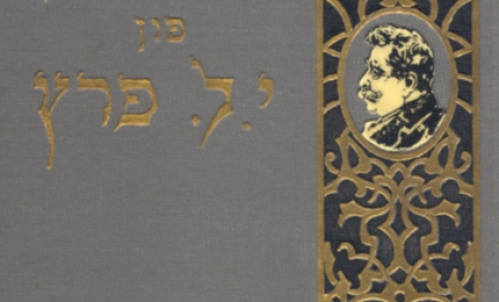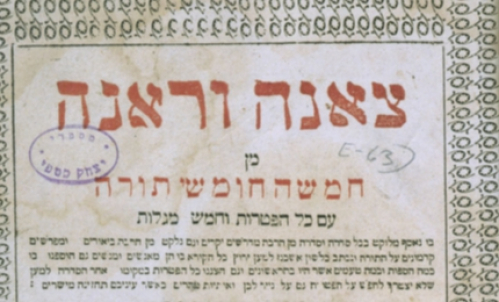YIVO Announces Major Project to Digitize its Historic Jewish Labor and Political Archive
(New York, NY) – The YIVO Institute for Jewish Research is delighted to announce the initiation of a new project to digitize its Jewish Labor and Political Archive. This will be an eight-year project to conserve, process, digitize, and make available online free-of-charge its collections documenting Jewish political, labor, and social movements in the United States and Europe from 1870 to 1992. The collection also contains materials relating to the Holocaust and Yiddish culture around the world.
The project, the largest archival digitization project in YIVO’s history consists of approximately 3.5 million pages. The archive includes correspondence of major Jewish political and labor leaders including Vladimir Kossovskii, Raphael Abromovitch, Emanuel Scherer, Shmuel Arthur Zygielbaum, Morris Hillquit, Emma Goldman, and David Dubinsky; documentation about revolutionary cells active in Europe from the late 1800s through WWII; ledger books detailing the activities of youth groups; manuscripts of speeches and lectures delivered by anarchists and revolutionaries and other Yiddish cultural figures; leaflets and flyers calling for protests and boycotts; posters advertising rallies and marches; sound recordings of members of the labor movement in the United States; and ephemera including flags, banners, and pins.
The Jewish Labor and Political Archive at YIVO is the most comprehensive resource on Jewish revolutionary, socialist, and labor movements in Europe and America. Many of the materials were originally collected by the Bund Archives which was founded in 1899 in Geneva, Switzerland, to gather the organizational records and revolutionary literature published in the underground printing shops of Eastern European and Russian revolutionary parties including the then-nascent Jewish Labor Bund.
The result of an impoverished Jewish working class in the Russian empire and the spread of secular ideas, the Bund was founded in Vilna (now Vilnius, Lithuania) in October 1897. It functioned as a kind of labor union and political party whose membership consisted of Jewish workers, intellectuals, and youth who fought against the oppressive forces of the Tsarist regime, the capitalist order, and the hierarchical Jewish community.
The Bund founded sports organizations, summer camps, Yiddish secular schools, and sanatoriums, serving members and their families as well as the broader Jewish community from Lithuania, Poland, Russia, the United States, and other countries across the world.
In the 1930s, the Bund stood at the forefront of the struggle against antisemitism in Poland by announcing a general strike in response to waves of anti-Jewish violence and pogroms. During World War II, the Bund organized underground resistance efforts and created a network of informants who brought news of Nazi atrocities to the world.
The custodial history of these materials adds an additional layer of importance to YIVO’s project to preserve the collections. In 1919, the headquarters of the Bund Archives and all materials were transferred from Geneva to Berlin and were housed in the German Social-Democratic Party building. When Hitler came to power in 1933, in an attempt to save the Bund Archives, those affiliated with it nominally sold the collections to the French government and smuggled the materials over the border in French diplomatic pouches. In 1944, the Bund Archives was captured by the Nazis, and the materials were assumed to have been destroyed. However, after the liberation of Paris in 1945, a large portion of the collection was found in crates abandoned several miles from the city, done so when the German army was forced into a hasty retreat. In 1951, the Bund Archives was brought to New York where it continued its collecting operations until 1992, when the entire Bund Archives was transferred to YIVO.
The materials documenting the activities of the Bund help illustrate how the transnational activities of the Jewish working class were instrumental in the international labor movement.
“In addition to providing fascinating material about Jewish political activity in pre-Revolutionary Russia and interwar Europe, these collections reveal the impact of an important aspect of the Jewish immigrant community on American politics and social life and deepen our understanding of the American Jewish experience,” said Jonathan Brent, CEO and Executive Director at YIVO.
The Jewish Labor and Political Archive at YIVO has been used in everything from scholarly publications to multi-day academic conferences to college courses to museum exhibitions. Hundreds of scholarly works have been published using these collections.
“There are many possibilities for new scholarship, classes, public programs, exhibitions, archival outreach, and artistic and literary works that draw on the Jewish Labor and Political Archive at YIVO,” said Mr. Brent.
“The significance of this undertaking for researchers around the world cannot be overstated…YIVO’s digitization project will make the rich history of the Bund, which includes everything from labor protest to Yiddish-language education to anti-Nazi resistance, widely and freely available for the first time…I consider YIVO’s digitization project to be the most important archival project of its kind in the United States presently,” said Tony Michels, the George L. Mosse Professor of American Jewish History at University of Wisconsin.
“The Bund Archives is exceptionally important… materials located in the Bund Archives have formed the foundations for groundbreaking books by both world-renowned and emerging scholars,” said Jack Jacobs, Professor of Political Science, John Jay College and the Graduate Center. “But I have no doubt that the project…will lead to a dramatic expansion in the number of such works.”
For any media inquiries please contact:
Shelly Freeman
Chief of Staff
YIVO
The YIVO Institute for Jewish Research is dedicated to the preservation and study of the history and culture of Eastern European Jewry worldwide. For a century, YIVO has pioneered new forms of Jewish scholarship, research, education, and cultural expression. Our public programs and exhibitions, as well as online and on-site courses, extend our global outreach and enable us to share our vast resources. The YIVO Archives contains more than 24 million original items, and YIVO’s Library has over 400,000 volumes—the single largest resource for such study in the world. yivo.org / yivo.org/the-whole-story

